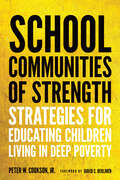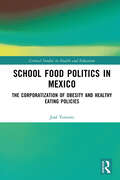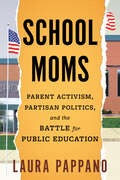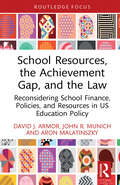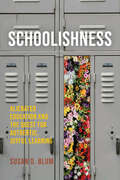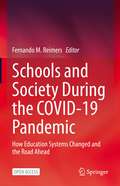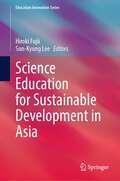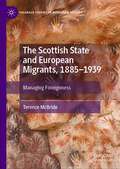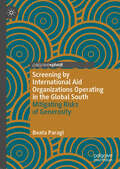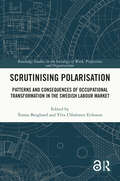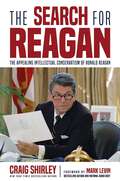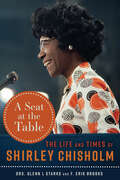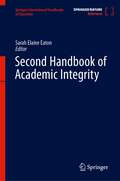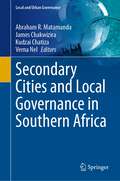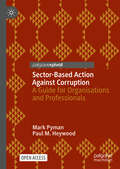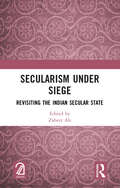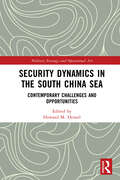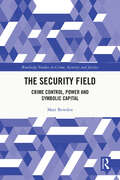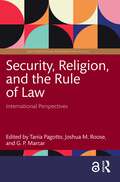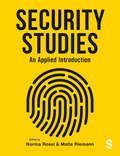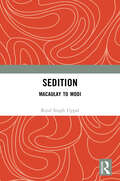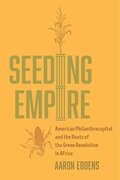- Table View
- List View
School Communities of Strength: Strategies for Educating Children Living in Deep Poverty
by Peter W. Cookson Jr.An evidence-based plan of action to achieve educational justice for K–12 public school students from families whose income is 50% or more below the US poverty threshold
School Food Politics in Mexico: The Corporatization of Obesity and Healthy Eating Policies (Critical Studies in Health and Education)
by José TenorioIntertwining policy analysis and ethnography, José Tenorio examines how, and why now, the promotion of healthy lifestyles has been positioned as an ideal ‘solution’ to obesity and how this shapes the preparation, sale and consumption of food in schools in Mexico. This book situates obesity as a structural problem enabled by market-driven policy change, problematizing the focus on individual behavior change which underpins current obesity policy. It argues that the idea of healthy lifestyles draws attention away from the economic and political roots of obesity, shifting blame onto an ‘uneducated’ population. Deploying Foucault’s concept of dispositif, Tenorio argues that healthy lifestyles functions as an ensemble of mechanisms to deploy representations of reality, spaces, institutions and subjectivities aligned with market principles, constructing individuals both as culprits for what they eat and the prime locus of policy intervention to change diets. He demonstrates how this ensemble enmeshes within the local cultural and economic conditions surrounding the provisioning of food in Mexican schools, and how it is contested in the practices around cooking. Expanding the conversation on the politics of food in schools, obesity policy and dominant perspectives on the relation between food and health, this book is a must-read for scholars of food and nutrition, public health and education, as well as those with an interest in development studies and policy enactment and outcomes.
School Moms: Parent Activism, Partisan Politics, and the Battle for Public Education
by Laura PappanoAn on-the-ground look at the rise of parent activism in response to the far-right attacks on public school educationFor well over a century, public schools have been a non-partisan gathering place and vital center of civic life in America--but something has changed. In School Moms, journalist Laura Pappano explores the on-the-ground story of how public schools across the country have become ground zero in a cultural and political war as the far-right have made efforts to seek power over school boards.Pappano argues that the rise of parent activism is actually the culmination of efforts that began in the 1990s after campaigns to stop sex education largely fizzled. Recent efforts to make public schools more responsive and inclusive, as well as the pandemic, have offered openings the far-right have been waiting for to organize and sway parents, who are frustrated and exhausted by remote learning, objections by teacher&’s unions, and shifting directives from school leaders. Groups like Moms for Liberty and Parents Defending Education are organizing against revised history curricula they have dubbed as "CRT," banning books, pressing for "Don't Say Gay" laws, and asserting "parental rights" to gain control over the review of classroom materials. On the other side, progressive groups like Support Our Schools and Red, Wine & Blue are mobilizing parents to counter such moves.Combining on-the-ground reporting with research and expert interviews, School Moms will take a hard look at where these battles are happening, what is at stake, and why it matters for the future of our schools.
School Resources, the Achievement Gap, and the Law: Reconsidering School Finance, Policies, and Resources in US Education Policy (Routledge Research in Education Policy and Politics)
by David J. Armor John R. Munich Aron MalatinszkyThis book offers a novel and up-to-date exploration of the common belief that increasing conventional school resources will increase academic achievement and help close gaps between various advantaged and disadvantaged students. Taking the scholarship around this question, such as James S. Coleman’s 1965 report on the Equality of Educational Opportunity, as a starting point, it brings in an extensive range of contemporary data sources and statistical analysis to offer an updated, robust, and considered review of the issue. Moving beyond these empirical questions, it also explores how these empirical findings have been utilized in “education adequacy” litigation, discussing the evolving law of adequacy cases, while explaining the challenges of introducing complex data and analyses within a litigation framework. Judges typically have little experience with the complexity of modern education data and the analyses required to draw sound inferences. It will thus be of interest to scholars, researchers, and faculty with expertise in education policy, the economics and sociology of education, and public policy.
School Resources, the Achievement Gap, and the Law: Reconsidering School Finance, Policies, and Resources in US Education Policy (Routledge Research in Education Policy and Politics)
by David J. Armor John R. Munich Aron MalatinszkyThis book offers a novel and up-to-date exploration of the common belief that increasing conventional school resources will increase academic achievement and help close gaps between various advantaged and disadvantaged students. Taking the scholarship around this question, such as James S. Coleman’s 1965 report on the Equality of Educational Opportunity, as a starting point, it brings in an extensive range of contemporary data sources and statistical analysis to offer an updated, robust, and considered review of the issue. Moving beyond these empirical questions, it also explores how these empirical findings have been utilized in “education adequacy” litigation, discussing the evolving law of adequacy cases, while explaining the challenges of introducing complex data and analyses within a litigation framework. Judges typically have little experience with the complexity of modern education data and the analyses required to draw sound inferences. It will thus be of interest to scholars, researchers, and faculty and jurists with expertise or interest in education policy, the economics and sociology of education, and public policy.
Schoolishness: Alienated Education and the Quest for Authentic, Joyful Learning
by Susan D. BlumIn Schoolishness, Susan D. Blum continues her journey as an anthropologist and educator. The author defines "schoolishness" as educational practices that emphasize packaged "learning," unimaginative teaching, uniformity, constant evaluation by others, arbitrary forms, predetermined time, and artificial boundaries, resulting in personal and educational alienation, dependence, and dread.Drawing on critical, progressive, and feminist pedagogy in conversation with the anthropology of learning, and building on the insights of her two previous books Blum proposes less-schoolish ways of learning in ten dimensions, to lessen the mismatch between learning in school and learning in the wild. She asks, if learning is our human "superpower," why is it so difficult to accomplish in school? In every chapter Blum compares the fake learning of schoolishness with successful examples of authentic learning, including in her own courses, which she scrutinizes critically.Schoolishness is not a pedagogical how-to book, but a theory-based phenomenology of institutional education. It has moral, psychological, and educational arguments against schoolishness that, as Blum notes, "rhymes with foolishness."
Schools and Society During the COVID-19 Pandemic: How Education Systems Changed and the Road Ahead
by Fernando M. ReimersThis open access book provides an analysis of the effects of the COVID-19 Pandemic on diverse education systems, and of the results of the policies adopted to sustain educational opportunities. Through a series of diverse national case studies, the book examines the preexisting fragilities and vulnerabilities in educational structures which shaped the nature of the varied responses, around the world, to teaching and learning during the worst crisis in public education in recent history.The chapters in the book take stock of how educational opportunities changed in various education systems around the world as a result of the Covid-19 pandemic, answering the question of what did education systems, and societies, learn about education as a result of the pandemic.The book covers diverse education systems, with varying levels of resources and facing distinct education challenges, including Brazil, Chile, Finland, Japan, Mexico, Norway, Portugal, Russia, Singapore, Spain, South Africa, and the United States.
Science Education for Sustainable Development in Asia (Education Innovation Series)
by Hiroki Fujii Sun-Kyung LeeThis book presents an Asian perspective on transformative science education in the context of the United Nations' Sustainable Development Goals (SDGs). The chapters are written by contributors who practiced science education for sustainability in a research project entitled “Teacher Education for ESD in the Asia-Pacific Region” from 2017 to 2019, supported by the Japan Society for the Promotion of Science, and the Japanese National Commission for UNESCO. The book showcases the contributors’ innovations in science education for sustainability, presenting case studies of science teaching and learning, science curriculum and assessment, science education in collaboration with local communities, and science teacher education. Embodying Asian sustainability education paradigms, policies, and practices, these case studies depict the diversity and uniqueness of natural, social, and cultural contexts in Asia, while demonstrating their commonalities. Through examining these case studies, this book aims to provide examples for praxis, and prospects, for new science classes, curricula, and teacher education in implementing education for sustainable development.
The Scottish State and European Migrants, 1885–1939: Managing Foreignness (Palgrave Studies in Migration History)
by Terence McBrideThis book examines the efforts of the government in Scotland to manage the increase of migrants travelling to Britain at the end of the nineteenth century. Focussing on the period between 1885 and 1939, the book explores how the Scottish machinery of government handled the administration of ‘foreigners.’ The author uses a comparative, thematic approach to analyse migrant experiences, identities, and relationships with state institutions. Drawing from state records held by the National Records of Scotland in Edinburgh, the book argues that Scottish officials in semi-autonomous boards began to recognise, describe and enumerate the presence of the ‘foreigner’ in the early twentieth century, framing their handling of foreignness in accordance with the Aliens Act of 1905. The author goes on to explain that institutions operating in Scotland developed a distinctly Scottish approach to alien matters, which continued up until the Second Word War. Therefore, an increasing number of importantdecisions affecting migrants were taken by a distinctly Scottish machinery of government, impacting on how Scottish officials understood foreignness, and how those identified as foreigners understood their identity in relation to Scottishness. Contributing significantly to current heated debates on migration and identity amongst researchers and the general public in Europe and beyond, this book provides essential insights into the ways in which a ‘sub-state’ began to develop practices, processes and attitudes towards migration which were not always in line with that of the central government.
Screening by International Aid Organizations Operating in the Global South: Mitigating Risks of Generosity
by Beata ParagiAid organizations usually embrace the idea of digitalization, both in terms of using diverse technologies and processing data digitally for improving their services, making their operations more efficient and even mitigating various risks. While digital fundraising, the use of biometric ID systems or digitalized cash and voucher assistance enjoys widespread attention both in academic and practitioner circles, it is less known how aid organizations navigate between counterterrorism legislations and data protection laws in technical terms. Limiting the discussion to the EU General Data Protection Regulation and by conceptualizing screening — commonly used to prevent the use of donor money for illicit purposes, money-laundering, terrorism finance or corruption — as a data processing operation conducted by larger international aid organizations operating in the Global South, this book focuses on the matter of ‘transparency’ and ‘right to information’ being at the nexus ofsurveillance studies and privacy studies. By means of legal and social science methods, it simultaneously explores screening in light of classic surveillance and analyses whether opacity around screening by NGOs (data controllers) is in line with the spirit of European Union data protection regime from the perspective of individuals (data subjects). In so doing, Paragi also contributes to the discussion on the politics of transparency and highlights the dilemmas and challenges aid organizations operating in authoritarian regimes or conflict settings may face.
Scrutinising Polarisation: Patterns and Consequences of Occupational Transformation in the Swedish Labour Market (Routledge Studies in the Sociology of Work, Professions and Organisations)
by Tomas Berglund Ylva Ulfsdotter ErikssonThis book scrutinises polarisation in Sweden, identifying patterns and variations in labour market transformation and exploring the consequences in terms of jobs, income, prestige, unionization and employment security, as well as the effects on different social groups. Through a series of empirical studies, it sheds light on changes in the occupational structure and the ways in which these changes interact with other societal trends, such as increased temporary employment, rising migration and decreased unionization, whilst also exploring changes in the evaluation of occupations and attitudes towards trade unions. Drawing on distinctly sociological perspectives, it shows how transformations in society and the labour market have affected conditions for individuals and considers whether these changes reinforce existing inequalities occasioned by polarisation or create new ones. Scrutinising Polarisation considers whether and how the Swedish labour market has polarized – and, if so, what this means for individual employees and labour organizations. It will therefore appeal to scholars with interests in the sociology of work and professions, social inequalities and labour market transformations.
The Search for Reagan: The Appealing Intellectual Conservatism of Ronald Reagan
by Craig ShirleyNever before has anyone explored the mind, soul, and heart of Ronald Reagan. The Search for Reagan explores the challenges and controversies in Reagan&’s life and how he successfully dealt with each, depicting a man who was never as conservative as some conservatives wanted him to be, but rather as conservative as he was comfortable being—a man who wanted to win on his own terms and integrity.Ronald Reagan was a singularly unique man and conservative who championed a wildly successful revolution—leading to more freedom and less government for the American people and to the fall of communism, while boosting American morale, which had been his three big goals. He was the first president in many years who believed optimism from the Oval Office had a direct bearing on the affairs of the nation. As a consequence, he left office more popular than when he entered with a whopping 73 percent approval. He is beloved even today as his presidential library is visited far more than any other presidential library, by more than five million people each year. He understood that American conservatism was based upon the individual and not the group. He is still regarded as one of the most admired men in America. The range of Reagan scholarship by virtue of books sold about him continues to grow. In his presidency, he solved the mystery of high inflation that had bedeviled his predecessor, high interest rates, and high gas prices. He created over twenty million new jobs, and the number of American millionares grew from 4,414 to 34,944. He quite literally changed our world for the better and is considered by most historians to be one of our four greatest presidents, along with George Washington, Abraham Lincoln, and Franklin Roosevelt.
A Seat at the Table: The Life and Times of Shirley Chisholm
by Glenn L. StarksWhen Shirley Chisholm was asked why she would dare run for president, her response was, why not her? Shirley Anita St. Hill Chisholm rose from being the child of immigrants to the United States to running for the highest office in the land. Her achievement in doing this as a Black woman was not in spite of her background but rather because of it. She became both the first African American woman elected to the US Congress and the first female African American of a major political party to make a serious run for president of the United States. She persevered by being steadfast in her political convictions and unwillingness to compromise on the issues she believed in. Chisholm directly challenged the political establishment and was successful because she galvanized women, minorities, young people, and the poor not only in her home district in Brooklyn, New York, but across the country. She was that catalyst for change who gave a political voice to so many segments of society who were, up until that time, ignored: women, minorities, the young, members of the gay community, domestic and agricultural workers, and the poor. Her run for the presidency in 1972 was a win in terms of her forging a unified grassroots campaign in which the voices of the previously voiceless joined together for a single cause of voting for someone who supported their diverse but collective interests.As many historians have pointed out, without Shirley Chisholm there may not have been a Hillary Clinton, Barack Obama, or Kamala Harris.
Second Handbook of Academic Integrity (Springer International Handbooks of Education)
by Sarah Elaine EatonThe book brings together diverse views from around the world and provides a comprehensive overview of academic integrity and how to create the ethical academy. At the same time, the Handbook does not shy away from some of the vigorous debates in the field such as the causes of academic integrity breaches. There has been an explosion of interest in academic integrity in the last 20-30 years. New technologies that have made it easier than ever for students to ‘cut and paste’, coupled with global media scandals of high profile researchers behaving badly, have resulted in the perception that plagiarism is ‘on the rise’. This, in combination with the massification and commercialisation of higher education, has resulted in a burgeoning interest in the importance of academic integrity, how to safeguard it and how to address breaches appropriately. What may have seemed like a relatively easy topic to address – students copying sources without attribution – has in fact, turned out to be a complex, interdisciplinary field of research requiring contributions from linguists, psychologists, social scientists, anthropologists, teaching and learning specialists, mathematicians, accountants, medical doctors, lawyers and philosophers, to name just a few.Because of this broad interest and input, this handbook serves as the single authoritative reference work which brings together the vast, growing, interdisciplinary and at times contradictory body of literature. For both established researchers/practitioners and those new to the field, this Handbook provides a one-stop-shop as well as a launching pad for new explorations and discussions.
Secondary Cities and Local Governance in Southern Africa (Local and Urban Governance)
by Abraham R. Matamanda James Chakwizira Kudzai Chatiza Verna NelThis book is the first to consider the roles, challenges and governance responses of secondary cities in southern Africa to changing circumstances. Among the challenges are governance under conditions of resource scarcity, managing informality, the effects and responses to climate change and the changing roles of the cities within the national space economy. It fills the gap in the literature on secondary cities with original case studies drawn from South Africa, Zimbabwe and Mozambique. The authors are all African scholars, working and living in the region with intimate knowledge of the settings they describe. The book is critical as it includes such regional case studies of different secondary cities in Southern Africa but also because of it’s multidisciplinarity: it contains substantive and pertinent issues such as climate change, disaster management, local economic development, and basic services delivery. It considers diverse environments, yet with similar challenges that could provide useful policy and governance proposals for other cities.
Sector-Based Action Against Corruption: A Guide for Organisations and Professionals (Political Corruption and Governance)
by Paul M. Heywood Mark PymanThis open access book provides an accessible insight into how to tackle corruption in organisations and institutions. It explains how to recognise and analyse corruption issues, together with knowledge and advice on how they can be avoided, prevented, or minimised. It also provides a framework through which readers can examine what strategies are available to tackle corruption issues, a rationale for how to prioritise strategies depending on circumstances and context, and guidance on how to critique various options. The book will appeal to professionals and practitioners, as well as academics interested in governance and corruption.
Secularism Under Siege: Revisiting the Indian Secular State
by Zaheer AliThis anthology makes a discerning attempt to bring into focus myriad dimensions of secularism and the foremost impediments to its attainment. The scholars who contributed to this volume have underscored that the disconnect between a modern-secular state and a conservative society is detrimental to recognizing an ideal secular-democratic polity. Then there is the burden of the past centuries that independent India has to carry on its young shoulders. The political factions in India invent their own historical narratives to advance their political agenda coupled with political and economic arguments leading to social dissensions and communal hatred, the ugliest manifestation of which is communal violence that occasionally takes on the form of anti-minority pogroms. The academic critiques of the concept of secularism and its correlated premises belted in this volume shall be of assistance not only to the scholars but also to the students of social sciences and the conscientious readers interested in knowing about the current socio-political milieu. This title is co-published with Aakar Books. Print editions not for sale in South Asia (India, Sri Lanka, Nepal, Bangladesh, Pakistan and Bhutan)
Security Dynamics in the South China Sea: Contemporary Challenges and Opportunities (Military Strategy and Operational Art)
by Howard M. HenselThis volume examines the South China Sea’s regional security dynamics, highlighting the challenges and opportunities for both littoral and non-littoral states.The South China Sea is a vital pathway for the great container ships and tankers, as well as for the naval vessels of today. Indeed, the security of the contemporary global economy is reliant more than ever upon the dependability of freedom of navigation through the waters of the South China Sea. This volume concentrates on the security of the South China Sea sub-region. It is designed to help illuminate the contemporary security dynamics within this important sub-region by highlighting its development, the contemporary challenges and opportunities confronting both the littoral states and the non-littoral powers that are active in the sub-region, and the policy responses of those states as they seek to defend and promote their national interests. This book is composed of 16 chapters and is organized into five thematic sections. Part I of the book is designed to set the historical context. Part II examines some of the contemporary challenges and opportunities that present themselves in the sub-region, while Part III focuses on Chinese policy in the South China Sea sub-region. Parts IV and Part V analyse and evaluate the contemporary policies of the various littoral and non-littoral powers that are active in the South China Sea sub-region. The collective analyses and assessments of the contemporary perceptions and policies of the various littoral and non-littoral powers active in the South China Sea in response to the traditional and non-traditional challenges within the sub-region that are examined in the chapters contained in Parts III, IV, and V, framed against the material presented in Parts I and II, provides the basis for observations concerning areas of conflicting and coinciding interests in the concluding chapter of the book.This book will be of interest to students of the South China Sea, maritime security, Asian politics, and international relations.
The Security Field: Crime Control, Power and Symbolic Capital (Routledge Studies in Crime, Security and Justice)
by Matt BowdenHow crime and security are governed has become a critical issue in criminology over the first quarter of the twenty-first century. Today, we see a broader landscape of regulatory players who are involved in the control and management of crime, whether in crime prevention, safety in the community or in providing private security services. The Security Field: Crime Control, Power and Symbolic Capital gets to grips with these changes and argues that this forms an emerging field in which different players appear to compete and co-operate but are ultimately vying to shape and order the field. This book draws on new thinking in the social sciences on questions of crime, fear and security and contributes to the expanding interest on the sociology and criminology of security by offering a Bourdieusian approach to plural policing and the everyday political economy of security.Drawing from Bourdieu’s concept of field, this book builds a theory of the security field based upon a series of in-depth interviews with security actors such as senior police officers, NGOs, private security professionals, government officials and community safety workers in Ireland. It demonstrates how security producers compete for cultural capital in its many forms – as data, information and relationships – and ultimately as a way of cementing their positions in this emerging field. It shows the dominant power of the formal police and central government in shaping and ordering this relational space. In doing so, The Security Field: Crime Control, Power and Symbolic Capital builds an empirical case from three distinct areas of security production: urban security, community safety and the connections between regulated private security and public crime prevention. It explores the challenges of securitisation in respect of public safety, security and rights and the way in which social problems such as drug use, homelessness and urban marginality are recast as ‘security’ concerns.An accessible and compelling read, this book will appeal to students and scholars of criminology, sociology, urban studies and security studies.
Security, Religion, and the Rule of Law: International Perspectives (Routledge Studies in Religion and Politics)
by Tania Pagotto Joshua M. Roose G. P. MarcarSecurity, Religion, and the Rule of Law argues that true, substantive, and sustainable national security is only possible through respect for the rule of law, human rights, and religious freedom. Despite the emphasis on national security and the war on terror that has preoccupied governments for over two decades, nations – and the world – seem to be more divided than ever, with a concomitant impact of increasing the risk of terrorism and religious and political violence. The national security paradigm, previously reserved primarily for foreign threats, has been turned increasingly inwards, focusing on a state’s own citizens as potential threats. This is often along religious lines, threatening fundamental human freedoms. This book provides a series of critical engagements on some of the most pressing issues at the interface of religion and security today, including proposing a deeper engagement with theology when dealing with freedom of religious belief, exploring a better understanding between domestic peace and international relations, abiding by the rule of law while countering terrorism, and developing a broader understanding of identities and of the nature of citizenship. It provides the resources to further reflect upon and address these topics, as well as stimulate further discussions on religion and security matters across a range of different disciplines. Wide-ranging case studies consider Australia, China, Europe, the Kurdish people, Nigeria, Russia, Ukraine, the United Nations, and the United States. This book will appeal to students and scholars across a range of disciplines, including international relations, law, philosophy, political science, religious studies, security studies, and theology. It will also appeal to human rights lawyers, judges, NGO researchers, governmental agency specialists, and policy makers.
Security, Religion, and the Rule of Law: International Perspectives (Routledge Studies in Religion and Politics)
by Tania Pagotto Joshua M. Roose G. P. MarcarSecurity, Religion, and the Rule of Law argues that true, substantive, and sustainable national security is only possible through respect for the rule of law, human rights, and religious freedom.Despite the emphasis on national security and the war on terror that has preoccupied governments for over two decades, nations – and the world – seem to be more divided than ever, with a concomitant impact of increasing the risk of terrorism and religious and political violence. The national security paradigm, previously reserved primarily for foreign threats, has been turned increasingly inwards, focusing on a state’s own citizens as potential threats. This is often along religious lines, threatening fundamental human freedoms. This book provides a series of critical engagements on some of the most pressing issues at the interface of religion and security today, including proposing a deeper engagement with theology when dealing with freedom of religious belief, exploring a better understanding between domestic peace and international relations, abiding by the rule of law while countering terrorism, and developing a broader understanding of identities and of the nature of citizenship. It provides the resources to further reflect upon and address these topics, as well as stimulate further discussions on religion and security matters across a range of different disciplines. Wide-ranging case studies consider Australia, China, Europe, the Kurdish people, Nigeria, Russia, Ukraine, the United Nations, and the United States.This book will appeal to students and scholars across a range of disciplines, including international relations, law, philosophy, political science, religious studies, security studies, and theology. It will also appeal to human rights lawyers, judges, NGO researchers, governmental agency specialists, and policy makers.Chapter 5 of this book is freely available as a downloadable Open Access PDF at http://www.taylorfrancis.com under a Creative Commons Attribution-Non Commercial-No Derivatives (CC-BY-NC-ND) 4.0 license.
Security Studies: An Applied Introduction
by Norma Rossi Malte RiemannSecurity Studies: An Applied Introduction offers a transformative tool to understand, analyse, and engage with the complexities of security in the modern world. This groundbreaking new text redefines the landscape of security studies with the following features: Policy-Relevant: each chapter provides analysis of policy responses to empirical security issues. This practical approach offers a toolkit to assess and contribute to real-world policy discussions. Empirical Application: vividly demonstrating the real-world relevance of Security Studies with online videos from leading security practitioners to show how theory informs practice. Pedagogically Rich: comprehensive online resources and chapters features such as ′security beyond the real′ and hands-on exercises that critically assess real-world security responses and their policy implications that offer ways to apply theoretical concepts in a highly innovative way. Innovative Structure: seamlessly integrating theoretical perspectives with empirical security concerns, this textbook offers a non-compartmentalised approach to theory and practice. Hot Topics: placing contemporary, creative, emerging, and underexplored approaches and empirical topics at the forefront including cyber security, racism, and space security. This is the perfect introduction for undergraduate and postgraduate students studying Security Studies and International or Global Security. Malte Riemann is Assistant Professor in Contemporary Armed Conflict, Leiden University, the Netherlands Norma Rossi is Associate Lecturer in International Relations, University of St Andrews, UK
Security Studies: An Applied Introduction
by Norma Rossi Malte RiemannSecurity Studies: An Applied Introduction offers a transformative tool to understand, analyse, and engage with the complexities of security in the modern world. This groundbreaking new text redefines the landscape of security studies with the following features: Policy-Relevant: each chapter provides analysis of policy responses to empirical security issues. This practical approach offers a toolkit to assess and contribute to real-world policy discussions. Empirical Application: vividly demonstrating the real-world relevance of Security Studies with online videos from leading security practitioners to show how theory informs practice. Pedagogically Rich: comprehensive online resources and chapters features such as ′security beyond the real′ and hands-on exercises that critically assess real-world security responses and their policy implications that offer ways to apply theoretical concepts in a highly innovative way. Innovative Structure: seamlessly integrating theoretical perspectives with empirical security concerns, this textbook offers a non-compartmentalised approach to theory and practice. Hot Topics: placing contemporary, creative, emerging, and underexplored approaches and empirical topics at the forefront including cyber security, racism, and space security. This is the perfect introduction for undergraduate and postgraduate students studying Security Studies and International or Global Security. Malte Riemann is Assistant Professor in Contemporary Armed Conflict, Leiden University, the Netherlands Norma Rossi is Associate Lecturer in International Relations, University of St Andrews, UK
Sedition: Macaulay to Modi
by Rijul Singh UppalThe liberal use of the sedition law in recent years, mainly by state governments intolerant of dissenting opinion, has provoked justified controversy. After some prominent individuals fell afoul of the law, activists, journalists, lawyers, and jurists took up cudgels on behalf of the victims, and demanded that the law be scrapped, as it belongs to the colonial era. The Supreme Court of India, in May 2022, admitted a host of petitions challenging the law as upheld in Kedar Nath Singh vs Union of India, 1961.The author believes that the fundamental right to free speech is a non-negotiable right in a democratic country, but the law is relevant for countering threats to national security and sovereignty. Examining the trajectory of the sedition law from its introduction by the British colonial power and its subsequent rejection by the Constituent Assembly of India, the author observes that the statute had to be hastily restored by the Provisional Parliament to cope with the challenges posed by communal rioting in many parts of the country, several years after independence. As such, it is pertinent in times of crisis. The current law undeniably needs safeguards against political misuse, but deserves a place on the statute.Print edition not for sale in South Asia (India, Sri Lanka, Nepal, Bangladesh, Pakistan and Bhutan)
Seeding Empire: American Philanthrocapital and the Roots of the Green Revolution in Africa
by Aaron EddensIn Seeding Empire, Aaron Eddens rewrites an enduring story about the past—and future—of global agriculture. Eddens connects today's efforts to cultivate a "Green Revolution in Africa" to a history of American projects that introduced capitalist agriculture across the Global South. Expansive in scope, this book draws on archival records of the earliest Green Revolution projects in Mexico in the 1940s and 1950s, as well as interviews at development institutions and agribusinesses working to deliver genetically modified crops to millions of small-scale farmers across Africa. From the offices of the Bill and Melinda Gates Foundation to the halls of the world's largest agricultural biotechnology companies to field trials of hybrid maize in Kenya, Eddens shows how the Green Revolution fails to address global inequalities. Seeding Empire insists that eradicating hunger in a world of climate crisis demands thinking beyond the Green Revolution.
